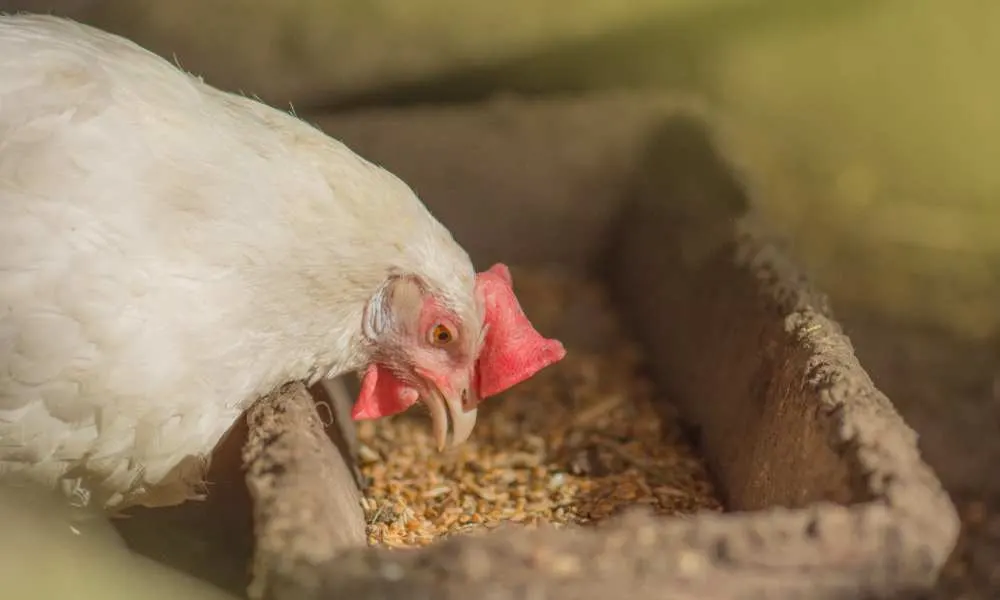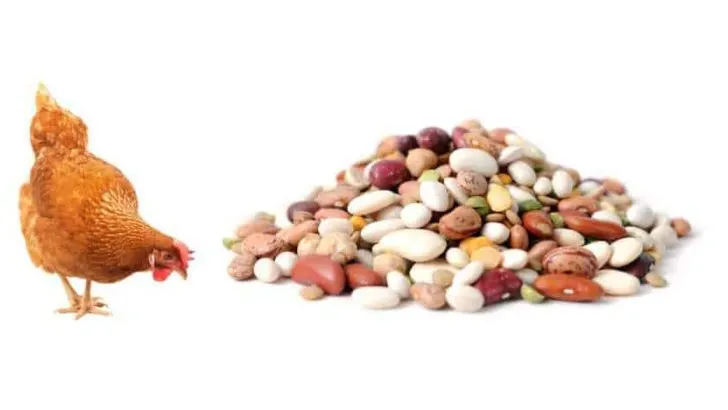Being on a constant move (like chickens) doesn’t leave us with much time to research chickens’ diet. Some questions need to be asked on a serious note, one of those being none-other-than:
Can chickens eat beans?
You’d be surprised to find out that they can, but only if you follow one serious condition.
What is that condition? Keeping in mind that there are so many different types of beans worldwide, is it safe for my chicks to eat all of them? Which is the best type and why?
If it is safe for humans to eat them, how come the same can’t be said for chickens? I, myself included, didn’t know all the answers and was dissatisfied with the information available on the internet. So I decided to change that by writing all of this and helping you out!
Stick around as I go into heavy detail regarding beans and their types and variants in chickens’ diet.

How To Implement Beans Into Chicks’ Diet?
There are a lot of different types of beans:
- Cranberry beans
- Great Northern beans
- Dark-Red Kidney beans
- Light-Red Kidney beans
- Black beans
- Pink beans
I bet that you didn’t know all those names before!
Interestingly, all of those types of beans share one common thing: they are potentially deadly for chicks if eaten raw. The same goes for us, humans. Keep that in mind next time you consider if eating raw beans is healthy.
Lectin is a compound that all beans possess. It’s made of glycoproteins present in a wide variety of plant foods that humans and animals consume. Not all are harmful, but the lectins present in raw and undercooked beans are.
Some people try to bypass this problem by serving dry beans to their chickens. This is not the way to go, as, with regular beans, dry beans possess the same lectin that is lethal if consumed by chicks. Giving them as few as three to four beans will lead to an imminent death after a few hours.
So how is it possible to serve beans to your chickens without putting them in any harm’s way?
Oddly enough, this is done by boiling the beans. By reaching high-temperature levels, lectin is released from the beans, making them edible for chicks. Soaking it in water is not enough as it requires a bare minimum of 30 minutes in boiling water.
A general cooking process for beans should be as follows:
- Soak the beans in a bowl filled with cold water and let them rest for approximately 6 hours -This will clean the external part of the beans, making them dirt-less, which is necessary
- Drain that water and fill in the bowl with new, fresh tap water
- Put the beans in a cooking pot that has enough space within to be able to hold a portion of water that is proportional to the number of beans
- Set the burner on high as you put the pot on it. Boiling it for 30 minutes will do the trick. Afterward, lower the fire and let it rest like that for at least 2 hours.
After you are done cooking the beans, you should drain the excess water and serve those cooking beans to your chickens. This is the only way that beans should be made, to be considered safe for serving chicks.
Cooked beans can be given to chickens frequently, but twice a week tends to be the most optimal amount. As for the serving size, you should buy a weighing scale to help you with that part. You should serve no more than 150 grams of cooked beans per meal.
It is noteworthy that I used the term “meal,” but that is not a correct way of putting it. Beans should mainly be considered a treat for chicks as they do not possess the complete nutrition necessary for your chicks’ diet.
Beans should be offered as a side treat in combination with their regular peeled or mashed food. That may prove beneficial towards building a healthy interest in eating all other necessary food that your chickens have on the daily menu.
To be on the positive side about serving your chickens beans, I suggest you listen to some of my ideas that I use regularly:
- You can put the cooked beans in a side dish right next to the primary meal. That will give you a vague idea of how much beans your chickens eat daily.
- On the other hand, you can have some fun if you decide to toss the beans individually towards your chicks. You will have a blast watching them run towards their beloved treats, and you can still keep counting how many beans you give them!
It is noteworthy that serving too many beans within the chickens’ regular diet should be avoided. Beans are high in fiber and water, and those can lead to irregular fill-ups inside their stomachs.
Make sure to balance the portion of beans to prevent that from happening!

Nutritional Value Of Cooked Beans
I did my fair share of research towards finding the nutritional value of cooked beans in the past. After evaluating nearly every single type of beans there is, I’ve concluded that kidney beans are the most beneficial for maintaining a healthy diet for your chicks’.
Take a closer look at its macros:
| Calories | 127 |
| Water | 67% |
| Carbs | 22.8 g |
| Protein | 8.7 g |
| Fiber | 6.4 g |
| Fat | 0.5 g |
| Sugar | 0.3 g |
I’ll break down even further some of its key elements:
Carbs
Carbs in metabolism provide a fundamental biochemical process that ensures a constant supply of energy to living cells. Considering that cooked beans possess high doses of carbs, you can rest assured as chickens will have enough power to run all around the place, all the time!
Protein
It represents a macronutrient that is essential for building muscle mass. Providing nearly 10 grams of protein per 100 grams of cooked kidney beans will make your chicks solid and sustainable in all circumstances.
Fiber
Cooked kidney beans are highly nutritious when you take into account their fiber. It can prove beneficial because it helps your chicks maintain optimal weight management. Chickens tend to eat everything they stumble upon so that fiber will kick in pretty nicely, don’t you agree?

Common Information Regarding Beans
In this topic, I will emphasize kidney beans as they are most commonly brought about when discussing beans. It shouldn’t be a surprise considering that they are the ones that are widely spread around the world.
You can buy them in every average-sized market. On the off chance that you possess a garden, consider growing some for yourself and your chickens. With you as the only supervisor of beans’ growth process, you will be sure of their origin.
Growing them by yourself can be achieved simply by following the next few steps:
- Put the beans in well-draining soil that has total sun exposure. The optimal time of the year should be at the beginning of spring when temperatures vary from 18 degrees Celsius to 24 degrees Celsius
- Be sure to space the seeds out at least 20 cm, one from the other
- Beans don’t require nitrogen, as they produce their own as a way to fertilize themselves
- Keep the soil moist at all times as water is necessary for them to grow
- When they start to turn yellow and hard, it means that it is time to harvest them. Concerning time, that should happen when 100 to 140 days have passed from the day you plant the beans.
As I said earlier, the process isn’t time-consuming or complex, and the result will definitely be worthy. Knowing where the beans came from will put your worries at ease, considering nowadays, people regularly spray them with toxins that keep them alive throughout the growing process.

Can Chickens Eat Beans? – Final Words
It is necessary to mix the food regime of chickens every once in a while, so if you are wondering can chickens eat beans, the answer is yes. You should only consider that after you’ve thoroughly cooked the beans by boiling them up.
Any type of beans is safe for them as long as you keep strict notice of that one simple thing. Every attempt at giving your chickens raw or dry beans will be detrimental to their health, as ingesting as little as four pieces of beans may lead to their death.
If you have a garden that is relatively near your chickens’ outpost, you should consider building a fence that doesn’t allow them in. They know what is best for them, but accidents do happen from time to time.
Don’t let yourself take any chance by putting your chicks in harm’s way and serve them only cooked beans, preferably Kidney beans!

